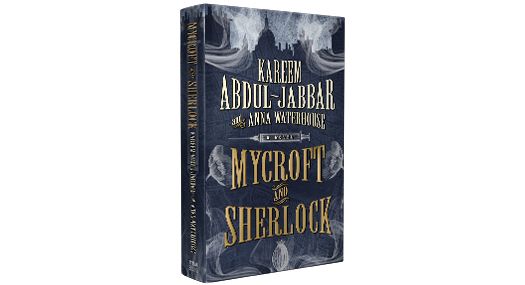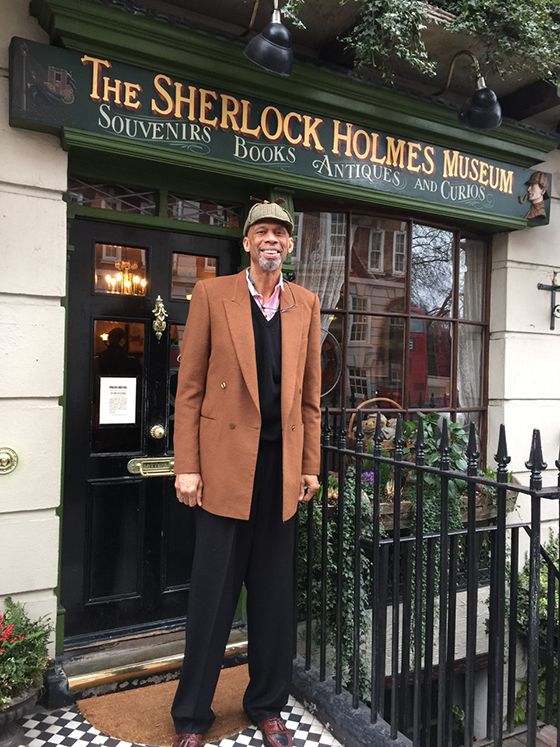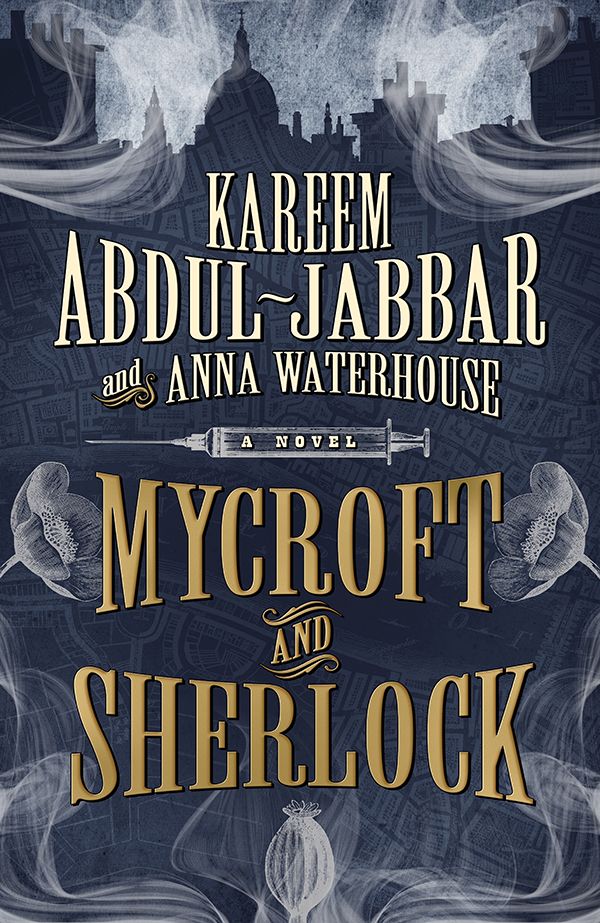MYCROFT & SHERLOCK: Exclusive Extract
Published on 29 June, 2018
Authored by Titan Books

Exclusive excerpt from Kareem Abdul Jabbar’s brand new novel Mycroft and Sherlock
Mycroft and Sherlock sees Kareem Abdul Jabbar return to Victorian England for this thrilling follow up to his first novel. In this glorious new adventure Mycroft must team up with his brother Sherlock for the first time to unpick a remarkable mystery.

The young Mycroft Holmes is now a force to be reckoned with at the War Office, although his brother Sherlock continues to be a source of vexation. When a young boy dies of a suspected overdose at an orphanage, the two brothers – along with Mycroft’s closest friend Cyrus Douglas – are drawn into an investigation that will reveal wicked dealings at the heights of the British establishment.
Critics raved about Jabbar’s first foray into the world of Sherlock Holmes in the eponymous Mycroft Holmes:
"For outsize polymathic energy and accomplishment, Abdul-Jabbar — N.B.A. champion, cultural ambassador, author — rivals Conan Doyle himself." - New York Times
"Abdul-Jabbar and Waterhouse have created a smart origin story for Mycroft that slots neatly onto the shelves next to the original canon." - Los Angeles Times
"Holmesians will find much to appreciate in the novel’s depiction of a character whose mind is as keen as Sherlock’s." - Time.com
"If you’re only aware of Abdul-Jabbar’s skill on the basketball court, get ready—this is an assured novel that fans of Holmes stories (old-school and new) will love." - Barnes and Noble
"The book is extremely well-written and well-researched, with layers of sensory detail and filmic tableaux...Doylean Easter Eggs are also sprinkled throughout and are presented with a witty subtlety that will delight longtime fans...Mycroft Holmes is a good book and an engaging mystery for Sherlockians and non-Sherlockians alike, but it’s a particular delight for aficionados of the Doylean world. Here’s hoping Abdul-Jabbar and Waterhouse write many more." - Baker Street Babes
Read an excerpt from the new book – due on October 9, 2018
Mycroft and Sherlock
By Kareem Abdul Jabbar and Anna Waterhouse
ISBN: 9781785659256
Hardcover
-- Excerpt --
London, England, 26 November 1872
Mycroft Holmes left his townhouse at Greville Place in St. John’s Wood and was opening his wrought-iron gate just as a passing neighbor called out a crisp good morning:
“No umbrella for you then, Mr. Holmes? You must be the adventurous sort: the papers predict a downpour!”
Mycroft politely bid him good day and glanced up at the eddying clouds, just as every Londoner had done every morning since time immemorial. But though the oatmeal-colored sky looked ominous, Mycroft was beholden neither to newsprint predictions nor to the common understanding of cloud formations, particularly as the average citizen could not tell cumulus from cumulonimbus. As for the volatile dance of wind and condensed water, he preferred other, surer markers.
His nose, for example.
With one whiff, he could gauge humidity to within a percentage point, and discern certain fragrances that emitted from grasses and plants the moment that percentage point altered.
I could have been a perfumer, he thought wryly, if duty and country had not intervened!
There were other signs. The day before, he’d taken a constitutional in Regent’s Park, a most serene location. Had its lofty pines discerned imminent rain, they would have shut up their giant cones against an eventual deluge so as to protect their seedlings. But they did not.
Now, would any sane man reckon on the inconstant atmosphere? The speculations of an overburdened newspaper reporter, sweating in a darkened cubicle and stinking of pomade, stale cigar smoke and printer’s ink? Or would he rely instead on the sagacity of a pine tree, whose sole job it was to keep account of the weather?
No, it would not rain today.
As for his neighbor, errant waves of hair curling out from under his hat, crystals of sleep on the bottom lashes of his left eye, and a small spot of fresh jam on his waistcoat were all indications that his wife had once again departed in a torrent of tears for her mother’s. Had she been home, she never would have permitted jam on her spouse’s morning toast in such copious amounts that he could spill any portion thereof.
Her absence also explained why the family doctor, arriving promptly each evening with a new salve or patent medicine to combat fluid retention, insomnia or irritability, had not made an appearance since Friday last.
Beyond all that, it was a curiosity, but true nonetheless, that people were forever predicting their own worst fears or most fervent desires. A good drenching would be solace to a man like that, as he could be certain he wasn’t the only poor wretch suffering.
Mycroft gazed down his street, at the handsome new houses set well back from the pavement, each one with its proper allotment of trees and greenery, and its languid, vacant air. The architect’s aim was no doubt to create a tranquil atmosphere for the families who resided there, and on the surface, it did just that. Mycroft’s home was no more than an unmarried man four years from thirty, and of his station, would purchase. It boasted no remarkable possessions, and but a handful of servants to keep the hearths clean, dust off the shelves, and keep the plants watered. As he ate most of his meals out, there was not even a proper cook…
His thoughts were interrupted by his new carriage, which came around the corner and halted at the curb. Huan’s dazzling smile was on full display as he waved from the sprung seat of a contraption so sparkling it all but glowed.
Before it stood a magnificent Irish Cob gelding, with a lustrous roan coat and snow-white mane and tail. However, Mycroft hadn’t yet bonded to him as he had to his Hanoverian warmblood, his dear Abie.
“A most excellent morning, eh, Mr. Mycroft?” Huan said in his lilting, melodic voice.
From the moment Mycroft had persuaded Huan to leave his buggy-for-hire business and his beloved mule Nico in Trinidad and come work for him as driver and bodyguard, Huan had ceased calling him by his Christian name but had added the prefix “mister.” Worse, when speaking about him to a third party, Mycroft would become “the mister.”
It was insufferable, as in Port of Spain he and Huan had become friends, even brothers in arms. But no amount of threatening or cajoling would persuade Huan otherwise: Mr. Mycroft he was, and Mr. Mycroft he would remain.
“Let us hope so, Huan,” Mycroft replied as he climbed aboard.
As for Huan’s “most excellent morning,” it wouldn’t have mattered if the sun were baking bricks or if rain were falling down in sheets. Huan created his own contentment wherever he went.
From within the carriage, Mycroft heard him click his tongue, followed by the clattering of hoofbeats on the cobblestones, the gelding’s rhythmical breath puffing in the morning chill as they proceeded on their way. What he had once found soporific was yet another reminder how much his life had changed—how different from whatever he had supposed it would be.
Of course, it would have been different, had Georgiana remained in his life. But then, what use was speculating? If one omitted Georgiana from his past, one omitted friendship, passion, adventure, heartbreak, and—in the end, he was forced to admit it—fortune.
No, had Georgiana lived, had he been blessed with the family he’d dreamt of, he would have remained what she had disdained: a rather dull government bureaucrat, grappling his way up the ladder one paltry rung at a time…
He glanced out the window and realized they were not heading to his bank (for that was always the first stop on a Tuesday) but towards Pall Mall.
He opened the trapdoor in the cab’s roof. “Huan?” he called out.
“Ah, Mr. Mycroft!” Huan called back. “So you awake from your dream state? You see we are going to your place of business?”
“Yes, I do see that—but why?”
“You do not recall? The Mr. Cardwell, he is waiting for you. With a surprise!”
Mycroft closed the trap with a frustrated sigh. There was no work to call him to the office this day, nor for the rest of the week. Indeed, his promotion from assistant to special consul meant that he could come and go as he pleased. Unless of course his employer called upon him… whereupon he would be forced to drop all plans and hurry off to Cumberland House, as they were doing now.
A shameful waste of a morning. He would have to make some excuse so that he could be at the bank before noon, for a visit to Fleet Street and his private deposit had more import.
In the same way that he could smell the rain, he had developed an unerring nose for economic calamities, and one was coming upon Britain faster than anyone could stop it. He speculated that it would reduce the country’s net worth, and that the underprivileged class would move from poor to destitute— which meant more abject misery in the streets.
Mycroft sometimes felt he would better serve his country in a post at the Treasury rather than the War Office. But as it was, without exposing his own wealth to scrutiny, he could not voice opinions in an official capacity—at least, none that anyone would take seriously. For what would a twenty-six-year-old special consul to the Secretary of State for War, with but one foray from his homeland, possibly know of international economies?
No, all he could do was to warn whoever would listen, and then shore up his own assets to at least ensure that those he cared for would never want for a thing.
He heard Huan open the trap.
“Mr. Mycroft?”
“Yes, Huan?” Mycroft replied, trying to keep the irritation out of his voice.
“Another body on Crutched Friars!”
It took Mycroft a moment. “Ah, yes. You are referring to the Savage Gardens Murders,” he called back.
Thus far unsolved, the killings had been so baptized when the first three nude and mutilated corpses had turned up, one after the other, near or on the small street known as Savage Gardens.
“They find just this morning,” Huan added.
“Ah. And who is the ‘they’ who found it?” Mycroft asked.
“A publican,” Huan replied. “Closing shop, two in the night it was, good working man, walking home, and he go falling over a body in the dark!”
“Dear, I hope he was not injured,” Mycroft replied.
“Oh no, he was dead. Cut up in four pieces!”
“No, I meant the publican.”
“Ah! No, he was fine. Just startled. But the corpse’s face? No more nose. And below the waist, no more…”
When Huan hesitated out of propriety, Mycroft completed his sentence: “His reproductive organs had been cut off?”
“Yes!” Huan exclaimed. “Fancy way of putting it. Seven men now, murdered in same way.”
“Truly, is it seven? I thought it was five. Must’ve missed a few,” Mycroft replied. Truth be told, he was rather uninterested in the whole sordid affair.
“Not to worry, I let you know the next one!” Huan said cheerfully. “Number six, he was Chinese like the others. But number seven? A white man. Maybe now, they investigate.”
To the present juncture, the victims had all been between twenty and forty years of age, sliced into four parts with near surgical precision, left to bleed to death, and then transported (by water, Mycroft wagered, as the river was nearby) to a poor but well-trafficked neighborhood so as to serve as a warning to others in the vicinity: Cross us, and this too shall be your fate.
In each case, given the small size of the Chinese community in London, the man’s identity had been quickly confirmed. They had all been proprietors or heavy frequenters of opium dens, ne’er-do-wells whom society, Oriental or otherwise, would not mourn. As for the dead white man, he was doubtless in the same proverbial boat: a drug user who most likely owed money to a less-than-sympathetic lender.
“This not something for the War Office?” Huan called out to him.
“In what sense?” Mycroft asked.
“The Chinese, they are angry for the opium! For what it does to their land, they say it’s Britain’s fault—”
“That would be a strange message indeed,” Mycroft countered, “for the Chinese to mangle their own people and display them in our poorer boroughs so as to, what? Protest the ugly consequence of the opium trade in their native land? Seems counterintuitive, does it not? I am hard-pressed to imagine they blame the working classes of Savage Gardens, Crutched Friars, Fenchurch and the like for China’s addiction! No. If one wishes to protest the drug trade and Britain’s substantial profit, best to do so before Parliament, where laws are birthed and enacted. In any event, one quarters a living body and cuts off nose and genitals to humiliate the victim, not the perpetrator.”
“Ah! Make good sense, that. Was it also not your English custom as well?”
“It was,” Mycroft admitted. “Hanging, drawing and quarter-ing, plus the removal of the ‘privy parts’… Though in England’s defense I hasten to add that we discontinued the practice several generations back.” He heard the trap shut again, and sighed. What an ugly, burdensome affair this was.
His shoes felt suddenly tight. He wished he could hurl them off and wiggle his toes, much as he had when he was a child. Instead, he removed his hat, raked his fingers through his blond hair—getting rather long; time for a trim before someone mistook him for a dandy—and leaned back against the padded leather cushion.
He detested surprises. Especially as he always knew perfectly well what they were about.

And if you didn’t get a chance to read the first in this series, you can read more about that book here.
